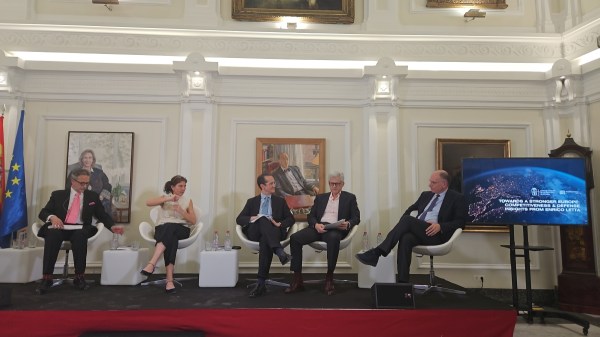The year 2022 has been scarred by war and continues to be marked by post-pandemic. In 2023, with a challenging geopolitical, economic, and technological landscape, public policy takes on a new dimension: understanding our environment and taking action to address the challenges, to improve strategies for economic and business growth, digital inclusion or green sustainability becomes critical.
To weekly follow the debate on Public Policy:
Find out the top 10 trending topics for 2023 on public policy issues related to technology and telecoms:
Achieving widespread and high-bandwidth connectivity
Digital infrastructures are a lever for global competitiveness. High-capacity, resilient networks with extensive coverage are essential to achieve the digital transformation of societies and economies and to improve citizens’ quality of life. The European Commission presented the European Digital Decade 2030 goals to achieve fibre gigabit connectivity for everyone and 5G everywhere. Accelerating the deployment of 5G in Europe is essential, but the right conditions are needed for investment.
To speed up high bandwidth deployments, simplifying civil work bureaucratic procedures, access to spectrum in reasonable conditions, a pro-investment regulation, legal certainty and aid for rural or underserved areas will be key.
In Latin America digital inclusion is an achievable dream. To connect and engage the unconnected, Telefónica’s Rural Manifesto proposes joining public and private efforts under a collaborative approach; and, it focuses on a new model revolving around three main axes: innovation, cooperation and sustainability of the investment model. And, as the fable of the “goose that lays the golden eggs” reveals, considering the provision of spectrum in right conditions, which will ultimately increase the welfare of consumers and businesses.
Consolidation, the market structure debate, and new markets dynamics
A strong and resilient telecommunications industry is the foundation for driving the digital and green transformation and harnessing the benefits it will generate for all. In contrast to other geographies, the sector is highly fragmented in Europe. And its market structure is weakening its investment and innovation capabilities, jeopardizing the ability to meet on time the digital leadership vision.
New mergers are going to take place in the telecommunications and technology sectors, and competition policy practice needs to be updated to the new market dynamics.
These new market dynamics in the tech markets have been acknowledged in Europe with the approval of the Digital Markets Act (DMA) that will start to apply in May 2023. It sets standards for how digital economy of the future will function, to ensure fair and open digital markets and a level playing field, “putting an end to the ever-increasing dominance of Big Tech companies”, said Andreas Schwab Member of the European Parliament.
Fair Share for network sustainability and broadband cost recovery
Over the last year, a global debate for broadband fair cost recovery and network investment sustainability has emerged. The telecommunications sector shares the commitment with governments to unlock the full potential of connectivity. But to do so, the industry asks for policies that create the right environment for the sustainability of network investment, rather than imposing the upgrade costs on all end users; policies that foster a more balanced digital ecosystem, allowing two sided markets to develop.
Indeed, Internet has changed drastically over the last 10 years and bargaining power asymmetries of large content providers are expanding, preventing telecoms to negotiate on a level playing field.
Accelerating the twin transition: digital and green sustainability
Digital technology is changing people’s lives and companies’ competitiveness. The EU’s digital strategy, with its Digital Decade goals, aims to make this digital transformation work for people and businesses, while helping to achieve its target of a climate-neutral Europe by 2050. The European Commission’s latest Digital Economy and Society Index (DESI) reveals a progressive improvement in the region’s digital indicators.
The telecommunications sector is an essential ally for overcoming global challenges and drive the digital transition in all the regions. All while digitalization is key to driving the green transition in different sectors.
Reducing digital gaps and the search for an inclusive transformation
The world is living in a society amid a digital transformation where digital divides are increasing. In this context, what is digital inclusion? Sharing knowledge of all kinds, supporting entrepreneurship and small enterprises, improving productivity, fostering access to basic services and reinforcing freedom and social justice are some of the benefits that digitalisation brings to societies.
Technological companies and public administrations must work to make the digital inclusion a reality, while a commitment to education, digital literacy for young and old and reskilling is essential to leave no one behind.
Strategic Autonomy and Industrial Policy
Economic interdependencies are being challenged by geopolitical tensions and economic uncertainty. This is leading to the emergence of new policy approaches to reinforce the strategic autonomy and production capacity of economies. Beyond energy, the focus should extend to the digital world, where deploying high-speed connectivity (5G/Fibre) and leading in future technologies (e.g. AI, quantum) or industries (e.g. chips, green tech) are becoming the centre of a fierce geopolitical competition. US’ Inflation Reduction Act (IRA), providing subsidies to produce and buy American starts to be perceived as undermining the multilateral trading system.
In this context, Europe is determined to “strengthen its digital sovereignty and set standards, rather than following those of others – with a clear focus on data, technology, and infrastructure”. For this to come to practice policymakers and business need to focus on revitalising the European Union’s broad global competitiveness and promoting economic growth and living standards. Designing a future-proof industrial policy, built up on boosting investments and innovation, is a key success factor for boosting Europe’s competitiveness and strategic autonomy.
The telecom sector is a strategic ally for any region to achieve its digital and green transition strategy. To this end, the sector asks for a regulatory and policy framework adapted to the evolving digital ecosystem and competition dynamics in the market.
Promoting innovation in the network, technologies, and business models to enhance competitiveness
Technology cycles are getting shorter: with 5G and 5G Standalone connectivity in full deployment, the arrival of 6G is already being talked about. And to take full advantage of the benefits of today’s technologies, the industry promotes network innovations such as Edge Computing, open interfaces (e.g. open RAN) and proposes to expose network capabilities to third parties by means of APIfication.
Promoting innovation to make regions more competitive is one of the main priorities of industrial policy, making operators one of the main partners for businesses and governments.
Finally, as Artificial Intelligence (AI) and new technologies become more advanced, there are concerns about its potential impact on employment, privacy, and other areas. Governments are considering how to regulate its development and use to ensure that it is used responsibly and ethically, with the added aim of not hindering innovation. On this field, Chat GPT is one of the most important and influential technologies to have come to market in 2022.
Building trust, protecting digital rights and privacy, and enabling international data flows
With the increasing amount of personal data being collected and stored by companies, there is a growing concern about the privacy of this data and digital rights. Data protection regulatory frameworks proliferate. We need a horizontal, flexible, and technologically neutral regulatory framework, a level-playing field for privacy and data protection.
And the solution for moving towards a framework that guarantees the effective protection of people’s privacy in the digital world lies is convergence. Europe has initiated the process adopting an adequacy decision on the EU-US Data privacy framework for data transfer in December 2022, but the third attempt may face mode legal challenges. And on the table is the debate on strategic autonomy and data localisation, in particular with the European cybersecurity certification schemes and US precedents. Legal certainty on cross-border data flows is of utmost importance.
Finally, related to misinformation, harmful and illegal content, the Digital Services Act (DSA) adopted in Europe, with a new transparency and accountability framework, entered into force on 1 November 2022, and will apply in 2023.
Cybersecurity in an increasingly digital world
Cybersecurity is one of the public policies priorities as the risk of cyberattacks and data breaches grow. Many factors have been impacting the cybersecurity landscape, including the pandemic, increasing geopolitical tension, supply chain challenges and the emergence of new connected technologies. To protect themselves from evolving cyber risks, organizations will need new and more coordinated approaches. They will have to revisit old concepts such as Zero Trust, based on the idea that no devices or users can be trusted and embrace newer ones.
The work of governments to improve cybersecurity measures to protect against these threats and to pursue engagement between the public and private sectors will be key. As an example, the European Union recently published a political commitment to strengthen ICT supply-chain security and proposed a new plan to expand and reinforce its EU-wide cyber defence capabilities. International and multi-stakeholder cooperation with a particular focus on a risk-based approach and coordinated response to incidents are some of the recommendations approved by OECD and launched at the Digital Economy Ministerial meeting on December 2022.
Enhancing cooperation in a fragmented world
The speed of innovation does not match the political and institutional pace and the world is becoming more and more fragmented. In this context, a multi-stakeholder approach with public-private and international cooperation is growing in importance. The activity in organisations like OECD, committed to digital economy, B20 the business voice to G20 leaders, Techaccord on cybersecurity, Internet Governance Forum, European Round Table (ERT), CEPAL or SEGIB, among others, turns out to be paramount.
In this context, international partnerships are essential. The results of the Global Gateway in Africa should strongly encourage the EU to extend this initiative to other regions in 2023, particularly Latin America, as mentioned by the President of the Commission.











